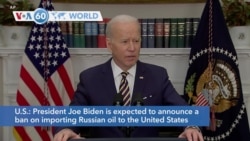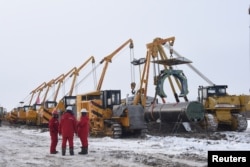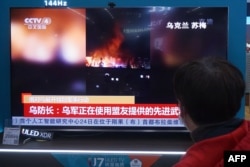China's effort to help Russia economically cannot offset Western-led sanctions aimed at resisting its invasion of Ukraine, analysts assert.
The latest sanction — U.S. President Joe Biden on Tuesday announced a U.S. ban on Russian oil and gas imports as an expression of opposition to the war.
"Sanctions are never the fundamental and effective way to solve problems," Liu Pengyu, spokesperson for the Chinese Embassy in Washington, wrote to VOA in an email. Since 2011, Liu said, the United States has imposed more than 100 sanctions on Russia without solving any problems.
"China decides its own position and policy based on the merits of the matter itself," he said. As for Russia and Ukraine, Liu said, "we will continue to play a constructive role in seeking and achieving peace."
While Beijing's opposition to the sanctions and China's plans to buy more Russian goods will help its northern neighbor, Moscow's current economy still depends more on Western countries than on China, according to experts.
Oil, food and finance
China's chief banking regulator Guo Shuqing said March 2 that his country would shun financial sanctions imposed by the West against Russia. Guo indicated that China, which has cast itself as neutral in the nearly two-week-old Russia-Ukraine war, would avoid changing its trade and financial relations with Russia or with Ukraine.
"China has the economic interests and strategic interests not to completely cut ties with Russia, and then I think also importantly that China seems to argue that what is important now is to deescalate, is to seek sort of more peaceful negotiations instead of further isolate and provoke Russia," said Liang Yan, professor and chair of economics at Willamette University in the U.S. state of Oregon.
Russia and China said February 4 that they intend to expand Russian oil shipments into China, which relies on the fuel for its giant export manufacturing sector. That day, exploration firms China National Petroleum Corp. and Rosneft Oil Co. of Russia signed an agreement to supply China with 200,000 barrels per day of crude oil through Kazakhstan for 10 years.
China counted Russia as its second-largest crude oil supplier last year, totaling 15.5% of its supply from abroad.
Chinese importers already buy grains from Russia's vast farmlands. The Carnegie Endowment for International Peace says Moscow is tapping China's multibillion-dollar, pan-Eurasian Belt and Road infrastructure initiative aimed at attracting investment and boosting the country's "transit potential" westward into Europe.
Officials in Beijing also have kept open their Cross-Border Interbank Payment System, or CIPS, to help Russian banks facing a ban on using the international SWIFT interbank messaging system. China's central bank launched CIPS in 2015 to increase the use of yuan for global transactions.
The U.S. Treasury's Office of Foreign Assets Control said on February 24 that it had joined allies in stopping Russia's biggest financial institutions and companies from raising capital. The actions could hit about 80% of all banking assets in Russia and will "have a deep and long-lasting effect on the Russian economy and financial system," the Treasury said in a statement.
Limited Chinese support
There are limits, though, to what Beijing can do for Russia, analysts say. Distance from Russia's gas fields will make construction of any new pipeline between the two countries expensive, said Paul D'Anieri, a political science professor with the University of California-Riverside.
"It's hard to say whether China will buy a bit more oil — the possibility is there — but it can't offset the amount that it used to sell into Western Europe and the rest of the world," said Liang Kuo-yuan, president of the Yuanta-Polaris Research Institute economics think tank in Taipei.
China received 16.5 billion cubic meters of gas last year from its northern neighbor.
China's interbank setup hardly compares to SWIFT, he added. He estimates that SWIFT, with some 11,000 institutions, processes $5 trillion to $6 trillion every day, while CIPS saw less than $12 trillion all of last year.
Economic support for Russia will reach a limit as China hopes to keep peace with Western countries that are sanctioning Russia in support of Ukraine, said Dexter Roberts, U.S.-based author of The Myth of Chinese Capitalism. Too much help would send the wrong message, he said.
Analysts say the two economies have natural boundaries, as well. Chinese consumers, like those in most of the world, seldom buy goods made in Russia, D'Anieri said. "What does anyone that we know buy from Russia except for maybe vodka — but not much — as opposed to China?" political science professor D'Anieri asked. "We buy tons of stuff that's made in China."
China relies on exports, he added, while Russia is "more self-sufficient" given its ample domestic supplies of oil and farm products.
But China is still Russia's top trading partner, Roberts said. "I do think longer term we're likely to see a continued growing trade relationship and investment relationship between China and Russia," he said. "For Russia it really matters."
Two-way trade between the two countries grew about 36% last year to $147 billion. But China took just 13.8% of all Russian exports, compared with the 45% shipped to Russia's top 12 Western-allied trading partners.









